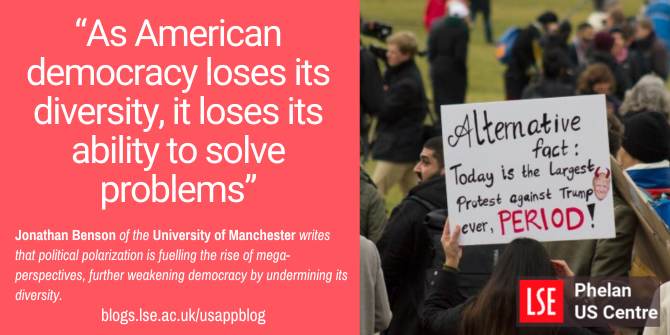 Polarization has become a fact of American political life, with many attributing it as the cause of the apparent increasing spread of misinformation and the fracturing of public debate. Jonathan Benson examines the role of polarization and this crisis of democracy, writing that the problem is not so much the rise of inaccurate political information but a narrowing of perspectives. These “mega-perspectives”, he writes, have come to dominate political discourse meaning that people have come to view politics through one of only two partisan lenses, allowing for few arguments, facts, and solutions.
Polarization has become a fact of American political life, with many attributing it as the cause of the apparent increasing spread of misinformation and the fracturing of public debate. Jonathan Benson examines the role of polarization and this crisis of democracy, writing that the problem is not so much the rise of inaccurate political information but a narrowing of perspectives. These “mega-perspectives”, he writes, have come to dominate political discourse meaning that people have come to view politics through one of only two partisan lenses, allowing for few arguments, facts, and solutions.
American democracy is growing more divisive. The Republican and Democratic parties are increasingly diverging in their policy positions, while the public is becoming more hostile towards supporters of the party they oppose. For many observers, this political polarization is at the heart of a larger ‘epistemic crisis’ of democracy where misinformation is widespread, public debate fractured, and the government’s capacity to solve problems is undermined.
The link between polarization and misinformation
It is hard not to see some link between polarization and this broader crisis, although we often misunderstand how they are tied together. A common view is that the fury of polarization is driving people to accept lies and falsehoods, dismissing concerns for what is accurate or honest. Research in political psychology offers us two stories for why this may be the case.
Story one points to the problems of echo chambers. Democrats socialize with Democrats, live in the same neighbourhoods, frequent the same corners of the internet, and Republicans do the same with Republicans. This then leads to a phenomenon psychologists call group polarization. Through one-sided arguments and the pressures of social conformity, like-minded groups become more extreme in their views and less accurate in their beliefs.
Story two points to issues of identity and bias. This view, known as cultural cognition, says that we are essentially tribal animals who see politics in terms of groups. Conservatives are more likely to reject climate change than liberals, for instance, because they view it as a threat to their identity and preferred picture of a good society. Identity politics therefore drives polarization and leads people to care more for their political team than for the truth.
Echo chambers and bias are not the whole story
These familiar stories face some similar difficulties. For one thing, while echo chambers and identity politics sound troublesome, these dynamics can improve our political beliefs. An understanding of the issue of sexual harassment, for instance, often needed women to first discuss this issue together, away from men and away from dominant ideas about gender roles. Recognizing and voicing your interests commonly requires ‘safe spaces’ where like-minded people can engage with each other. Similarly, in a world where groups matter and face similar problems, thinking in terms of group identity is not always a bias. Instead, it can be an easy and effective way to appreciate one’s own position in an otherwise complex political environment.

Photo by micheile henderson on Unsplash
These stories also struggle to identify what is unique about polarization. Political scientists have long found that the American public generally holds inaccurate and incorrect beliefs about politics, and this is true in polarized and non-polarized times alike. Why then is American democracy experiencing greater tribulations today?
The answer is that such problems may have less to do with people’s willingness to accept falsehoods and more to do with their diversity. American polarization is associated with an alignment of party identification with other social identities. Whereas Republicans are increasingly white, Christian, and conservative, Democrats are increasingly non-white, secular, and liberal. The result is that politics has become an ‘us vs them’ conflict between two exclusive political camps.
While the above stories say little about why this is the case, one likely factor is political leaders. Politicians often see advantage in divisive forms of rhetoric which frame politics in terms of ingroups and outgroups. President Trump, for instance, frequently spoke of a group of ‘real’ Americans with a predominantly white and Christian view of American greatness, under threat from the dangerous and more diverse Democrats. In launching his re-election campaign in 2019, he declared that his supporters ‘Keep America Great’ while their ‘radical Democrat opponents are driven by hatred (…) to destroy our country as we know it’.
Perspectives and mega-perspectives
The problem with this polarizing rhetoric is not simply that it may involve falsehoods but that it alters our perspectives. Perspectives are the practical points of view from which we all see politics. To provide overly simplified examples, to view politics as a woman or a working-class man is to view it from a certain social position informed by a range of experiences. Through these lenses, certain issues will then come more easily into focus, while others will fall outside the field of vision. This is why women are often better able to recognize problems such as sexual harassment and working-class people problems of financial insecurity.
For a democracy to work effectively, it needs a diversity of perspectives. If people do not view politics from a range of different social positions, then political debate risks overlooking or misreading important concerns. Marginalizing the perspectives of people of colour, for instance, often results in a politics which chronically misunderstands a range of social problems, from police violence to housing discrimination. A greater diversity of perspectives, alternatively, gives us the best chance of grasping all of society’s ills.
Polarized rhetoric undermines this diversity. By telling us that politics is a struggle of good vs. evil between an ‘us’ and a ‘them’, it suggests that there are only two perspectives from which to view and understand politics. We are told that there are just two political camps, that we must fall into only one, and that we must understand the world through this camp’s perspective. The result is that we start to interpret politics in far fewer ways, focus on fewer issues, and think about these issues in more binary ways.
While Christians and conservatives may have once focused on different problems and seen different issues as important, they have increasingly taken up the same singular Republican perspective. They have come to hold a shared and more uniform point of view. Polarization therefore collapses our varied identities and compresses them into a more limited number of mega-perspectives. If American politics is framed as a struggle between Republican and Democratic camps, then people will increasingly come to view politics through just one of these two partisan lenses.
The issues most important to these two mega-perspectives then take centre stage in political debate, pushing other worthy issues to the wayside. Important problems go ignored as divisive debates over book banning or student protests capture an ever-greater portion of political consciousness. Issues which do manage to grab attention are then discussed in more binary and impoverished ways, so even technical and complex topics such as COVID-19 are squeezed into an ‘us vs them’ conflict which allows for few arguments, few facts, and few solutions.
As American democracy loses its diversity, it loses its ability to solve problems. Polarization alters our perspectives, makes us see politics from more limited points of view, and leaves us less able to recognize and address our problems.
- This article is based on an open-access paper, ‘Democracy and the Epistemic Problems of Political Polarization’, in the American Political Science Review.
- Note: This article gives the views of the author, and not the position of USAPP – American Politics and Policy, nor the London School of Economics.
Shortened URL for this post: https://bit.ly/3uFD8Oq






